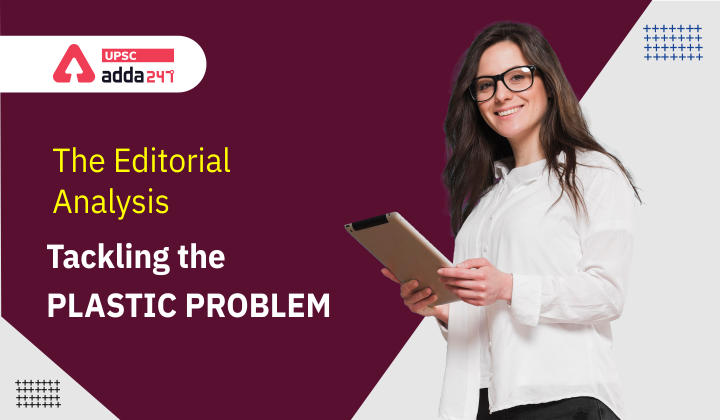Table of Contents
Tackling the Plastic Problem- Relevance for UPSC Exam
- GS Paper 3: Environment- Conservation, environmental pollution, and degradation.
Tackling the Plastic Problem– Context
- A report released by the United Nations Environment Program (UNEP) last year estimated that emissions of plastic waste into the aquatic ecosystems may triple by 2040 if no meaningful action is taken.
- In this context, the UN Environment Assembly meeting in February-March 2022 may finalize a way forward for global cooperation in this regard.
Tackling the Plastic Problem- Negative Externalities of Plastic Pollution
- Long-Lasting: Plastic products in the form of bags, bottles, etc. are convenient, but take a very long time to decompose.
- Increasing Plastic Waste: Increasing global consumption and low participation in recycling programs have led to more plastic waste.
- Social Costs of Plastic Consumption: It affects the livelihoods of a major chunk of the population dependent on marine life. Marine fisheries and wildlife are mainly harmed due to plastics.
- Consumption Externality: It involves many people, rather than a production externality, which involves one or multiple firms.
- Impact: Consumption externality is more challenging to address, as it is difficult to differentiate the behaviour of consumers.
- Consumption externality is more challenging to address, as it is difficult to differentiate the behaviour of consumers.
The Editorial Analysis: Troubled Waters
Challenges of Existing Methods of Controlling Plastic Pollution
- Plastic Ban: A number of regions across the world have banned plastic bags. This approach promotes a sustainable environment, intergenerational equity, saves marine and wildlife ecosystems, and restores soil quality.
- Associated Challenges: it causes inconvenience for consumers, increases substitution cost, and creates unemployment shocks as it affects the production of plastics, leading to less economic activity, less income generation and finally less employment.
- Replacement of Plastics: The replacement of plastics, which are low cost, with substitutes results in a deadweight loss for the economy.
- Ineffectiveness of Imposing Tax: It is difficult to identify the exact tax to be imposed, which may depend on country-specific circumstances.
Tackling the Plastic Problem- Way Forward
- ‘Command and Control’ Approach: The efficiency of such a regulation depends on its architecture — how well it is planned, designed and executed.
- It should be credible, transparent and predictable.
- Eco-taxes or Subsidies: A tax rate needs to be carefully determined and should work as a deterrent. In general, the rate of tax on plastics should be higher than the cost of compliance.
- Eco-taxes may be imposed in the various stages of production, consumption or disposal of plastics.
- Pollution due to plastics may happen during the production stage. That is the logic for imposing a tax on polluting inputs, as it forces the producer to look for cleaner substitutes.
- Pollution also occurs during the consumption stage, and thus an eco-tax is recommended to discourage consumption.
- Evaluation of Social Cost: Social cost should be evaluated differently in the local/regional and global contexts.
- While health and hygiene are predominant considerations in the former case, climate change is the predominant consideration in the latter.
- Right Evaluation of Impact: Evaluation of damage due to plastic pollution to the environment should be based on scientific assessment of the adverse impacts on health, environment, etc.
- The eco-tax rate on plastics may thus be fixed commensurate to the marginal social cost so evaluated.
- Comprehensive Policy Measure: Comprehensive Policy measures against plastics should involve the following three complementary activities-
- The removal of existing taxes and subsidies that have a negative environmental impact,
- Taking into account the different types or grades of plastics, and
- Restructuring existing taxes in an environmentally friendly manner.
- Other Measures:
- Promoting multiple uses of plastics through better waste management, educating the public on the harmful use of plastics,
- Providing subsidy for research and development activity for substitute development, appropriate disposal mechanisms, and waste management and
- Use of waste for constructive usage like roads.
The Editorial Analysis: The gaps in the plan to tackle plastic waste
The Editorial Analysis: The gaps in the plan to tackle plastic waste





 TSPSC Group 1 Question Paper 2024, Downl...
TSPSC Group 1 Question Paper 2024, Downl...
 TSPSC Group 1 Answer key 2024 Out, Downl...
TSPSC Group 1 Answer key 2024 Out, Downl...
 UPSC Prelims 2024 Question Paper, Downlo...
UPSC Prelims 2024 Question Paper, Downlo...




